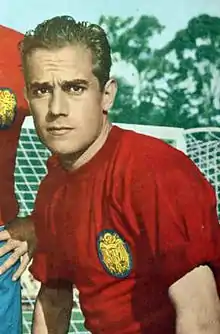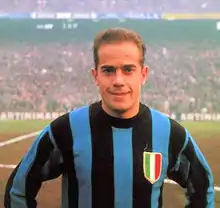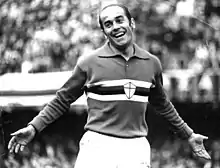Luis Suárez (footballer, born 1935)
Luis Suárez Miramontes (Spanish pronunciation: [ˈlwis ˈswaɾeθ miɾaˈmontes]; born 2 May 1935) is a Spanish former footballer and manager. He played as a midfielder for Deportivo de La Coruña, España Industrial, FC Barcelona, Inter Milan, Sampdoria and the Spain national team. Suárez is regarded as one of Spain's greatest players. He is also regarded as one of the greatest football players of all time. He was noted for his elegant, fluid, graceful style of play.[1] Nicknamed El Arquitecto - The Architect - he was noted for his perceptive passing and explosive shot, and in 1960, he became the only Spanish-born player to win the Ballon d'Or. In 1964 he helped Spain win the European Championship. Suárez originally achieved prominence as a creative inside forward, or attacking midfielder in modern terms, for the great Barcelona team of the 1950s before he joined Inter Milan where he reached his prime as deep-lying playmaker for the legendary Grande Inter team of the 1960s. He played a pivotal role in the success of Herrera's Inter Milan side, and was one of the primary creative forces in the squad, due to his skill on the ball, vision, and passing range.[2] He retired as a player in 1973, after three seasons at Sampdoria.
 Suárez with Spain national team in 1962 | |||||||||||||
| Personal information | |||||||||||||
|---|---|---|---|---|---|---|---|---|---|---|---|---|---|
| Full name | Luis Suárez Miramontes | ||||||||||||
| Date of birth | 2 May 1935 | ||||||||||||
| Place of birth | A Coruña, Galicia, Spain | ||||||||||||
| Height | 1.75 m (5 ft 9 in) | ||||||||||||
| Position(s) | Inside right / Attacking midfielder | ||||||||||||
| Youth career | |||||||||||||
| Perseverancia | |||||||||||||
| 1949–1953 | Fabril | ||||||||||||
| Senior career* | |||||||||||||
| Years | Team | Apps | (Gls) | ||||||||||
| 1953–1954 | Deportivo La Coruña | 17 | (3) | ||||||||||
| 1954–1955 | España Industrial | 21 | (6) | ||||||||||
| 1955–1961 | Barcelona | 122 | (61) | ||||||||||
| 1961–1970 | Inter Milan | 256 | (42) | ||||||||||
| 1970–1973 | Sampdoria | 63 | (9) | ||||||||||
| Total | 479 | (121) | |||||||||||
| National team | |||||||||||||
| 1957–1972 | Spain | 32 | (14) | ||||||||||
| Teams managed | |||||||||||||
| 1975 | Inter Milan | ||||||||||||
| 1975 | Sampdoria | ||||||||||||
| 1975–1976 | SPAL | ||||||||||||
| 1976–1977 | Como | ||||||||||||
| 1977–1978 | Cagliari | ||||||||||||
| 1978–1979 | Deportivo La Coruña | ||||||||||||
| 1980–1988 | Spain U21 | ||||||||||||
| 1988–1991 | Spain | ||||||||||||
| 1992 | Inter Milan | ||||||||||||
| 1994 | Albacete | ||||||||||||
| 1995 | Inter Milan | ||||||||||||
Honours
| |||||||||||||
| * Senior club appearances and goals counted for the domestic league only | |||||||||||||
Suárez subsequently began a career as a coach and has managed Inter Milan on three occasions, the last two on a caretaker basis. Suárez has also coached both Spain U21s and the senior Spain team. He was in charge of the latter for 27 games and led them to the second round of the 1990 World Cup. He has also coached several Italian and Spanish club sides. He is currently a scout for Inter Milan.
Club career
Early career
Luis Suárez Miramontes was born on 2 May 1935, in A Coruña, Galicia. He lived on Avenida de Hércules in the working-class neighborhood of Monte Alto where he was known by the diminutive Luisito.[3]
He began his career with local side Deportivo de La Coruña in 1949 and worked his way through the junior sides before making his La Liga debut with Deportivo on 6 December 1953 in a 6–1 defeat to FC Barcelona. Among his teammates at Deportivo were Pahiño and Arsenio Iglesias. He played 17 games and scored 3 goals for Deportivo during the remaining season. In 1954, he was transferred to CF Barcelona but spent most of the 1954–55 season playing for their reserve side, España Industrial, in the second division.
FC Barcelona
Between 1955 and 1961 Suárez was a regular in a FC Barcelona team that also included the Hungarian trio Ladislao Kubala, Zoltán Czibor and Sándor Kocsis, alongside Ramallets and Evaristo. With Helenio Herrera as coach, the club and Suárez won a domestic league-cup double in 1959 and a league-European cup double the subsequent year. As a result, Suárez was voted Ballon d'Or in 1960, beating Real Madrid's Ferenc Puskás. One of his last games for the club was the final of the European Cup in 1961 which they lost 3–2 to Benfica.
Inter Milan

In 1961, Suárez became the world's most expensive footballer and the first £100,000 transfer when FC Barcelona sold him to Inter Milan for 250 million Italian lire (£142,000). The move saw him follow his mentor Helenio Herrera.
Suárez became a regular in Herrera's Grande Inter team that won three Serie A titles, two consecutive European Cups and two Intercontinental Cups. Between 1961 and 1970 he made 328 appearances for Inter and scored 55 goals.

On 10 March 1963, he scored three times in a 6–0 win over Genoa; this was the only hat-trick by a Spaniard in Serie A until Suso's for Genoa in 2016, to whom Suárez sent his congratulations.[4]
International career
Suárez also played 32 games for Spain and scored 14 goals. He made his debut on 30 January 1957 in a 5–1 victory over the Netherlands and represented Spain at both the 1962 and 1966 World Cups. However his greatest achievement with Spain came in 1964 when, together with Josep Maria Fusté, Amancio Amaro, José Ángel Iribar and Jesús María Pereda, he helped them win the European Championship. He played his final game for Spain in 1972.
Honours
Club
- La Liga: 1958–59, 1959–60
- Copa del Rey: 1957, 1959
- Fairs Cup: 1958, 1960
- Serie A: 1962–63, 1964–65, 1965–66
- European Cup: 1963–64, 1964–65
- Intercontinental Cup: 1964, 1965
International
Individual
International
- Ballon d'Or: 1960[5]
- World Soccer: World XI: 1963, 1964, 1965[6]
- UEFA European Championship Team of the Tournament: 1964[7]
- Golden Foot: 2008, as football legend[8]
National
- Marca Leyenda: 2016[9]
Orders
- Gold Medal of the Royal Order of Sporting Merit: 2001

Career statistics
.JPG.webp)
International
| Spain national team[10] | ||
|---|---|---|
| Year | Apps | Goals |
| 1957 | 6 | 4 |
| 1958 | 3 | 2 |
| 1959 | 5 | 5 |
| 1960 | 7 | 3 |
| 1961 | 1 | 0 |
| 1962 | 2 | 0 |
| 1963 | 1 | 0 |
| 1964 | 2 | 0 |
| 1965 | 2 | 0 |
| 1966 | 2 | 0 |
| 1967 | 0 | 0 |
| 1968 | 0 | 0 |
| 1969 | 0 | 0 |
| 1970 | 0 | 0 |
| 1971 | 0 | 0 |
| 1972 | 1 | 0 |
| Total | 32 | 14 |
International goals
| # | Date | Venue | Opponent | Score | Result | Competition |
|---|---|---|---|---|---|---|
| 1. | 10 March 1957 | Santiago Bernabéu, Madrid, Spain | 1–1 | 2–2 | 1958 FIFA World Cup qualification | |
| 2. | 31 March 1957 | Heysel, Brussels, Belgium | 0–2 | 0–5 | Friendly | |
| 3. | 31 March 1957 | Heysel, Brussels, Belgium | 0–5 | 0–5 | Friendly | |
| 4. | 8 May 1957 | Hampden Park, Glasgow, Scotland | 2–2 | 4–2 | 1958 FIFA World Cup qualification | |
| 5. | 13 March 1958 | Parc des Princes, Paris, France | 1–2 | 2–2 | Friendly | |
| 6. | 15 October 1958 | Santiago Bernabéu, Madrid, Spain | 4–1 | 6–2 | Friendly | |
| 7. | 28 June 1959 | Silesian Stadium, Chorzów, Poland | 1–1 | 2–4 | UEFA Euro 1960 qualifying | |
| 8. | 28 June 1959 | Silesian Stadium, Chorzów, Poland | 1–3 | 2–4 | UEFA Euro 1960 qualifying | |
| 9. | 22 November 1959 | Mestalla, Valencia, Spain | 2–0 | 6–3 | Friendly | |
| 10. | 22 November 1959 | Mestalla, Valencia, Spain | 3–0 | 6–3 | Friendly | |
| 11. | 17 December 1959 | Parc des Princes, Paris, France | 0–1 | 4–3 | Friendly | |
| 12. | 10 July 1960 | Estadio Nacional, Lima, Peru | 0–2 | 1–3 | Friendly | |
| 13. | 10 July 1960 | Estadio Nacional, Lima, Peru | 0–3 | 1–3 | Friendly | |
| 14. | 26 October 1960 | Wembley, London, England | 2–2 | 4–2 | Friendly |
References
- Luis Suárez Archived 2 February 2010 at Archive.today
- "Great Team Tactics: Breaking Down Helenio Herrera's 'La Grande Inter'". Retrieved 15 September 2014.
- "Luis Suárez descubre una placa más "tocante" que el Balón de Oro".
- "Luis Suárez: "Enhorabuena Suso, ahora estamos dos en el club"" [Luis Suárez: "Congratulations Suso, now we are in a two-person club"] (in Spanish). Marca. 4 April 2016. Retrieved 4 April 2016.
- Rob Moore; Karel Stokkermans (21 January 2011). "European Footballer of the Year ("Ballon d'Or")". RSSSF. Retrieved 22 December 2015.
- "ERIC BATTY’S WORLD XI – THE SIXTIES" Retrieved on 29 November 2015
- "EURO 1964 team of the tournament". UEFA. Retrieved 11 March 2016.
- "Legends". Golden Foot. Archived from the original on 25 September 2015. Retrieved 23 September 2015.
- "Luis Suárez recibió el MARCA Leyenda – Marca.com". Marca.com (in Spanish). Retrieved 5 February 2017.
- Luis Suárez – Goals in International Matches
External links
| Wikimedia Commons has media related to Luis Suárez Miramontes. |
- Luis Suárez – FIFA competition record
- Luis Suárez – UEFA competition record
- Luis Suárez at BDFutbol
- Luis Suárez manager profile at BDFutbol
- International Stats
